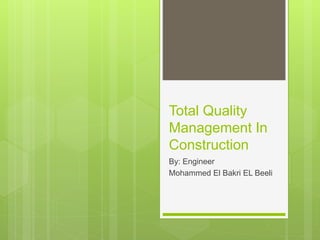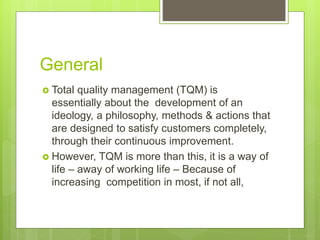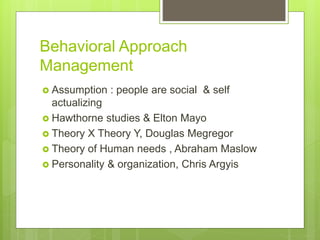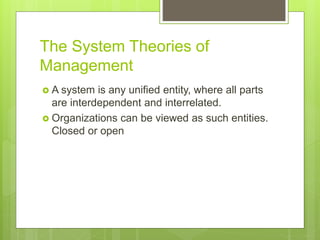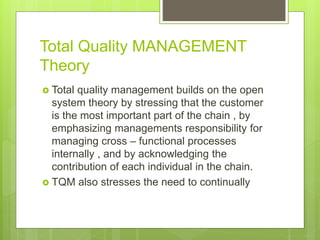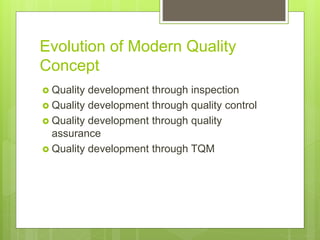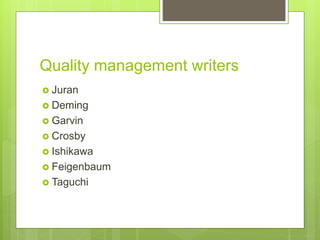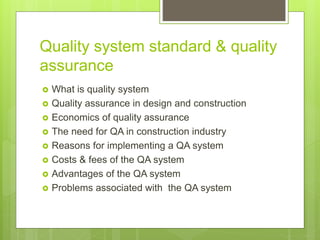Total Quality Management In Construction
- 1. Total Quality Management In Construction By: Engineer Mohammed El Bakri EL Beeli
- 2. General  Total quality management (TQM) is essentially about the development of an ideology, a philosophy, methods & actions that are designed to satisfy customers completely, through their continuous improvement.  However, TQM is more than this, it is a way of life – away of working life – Because of increasing competition in most, if not all,
- 3. General  Commercial sectors, attention to quality in order to satisfy the requirements of consumer’s wants & needs signifies a major change in the way organizations are managed.
- 4. What is Management ÔÇõ The application of measures to ensure that financial, human & physical resources are planned, organized, led, controlled and staffed effectively, or the achievement of goals through facilitating an effective process of planning, organizing, leading, controlling, & staffing. ÔÇõ Or the process of getting activates completed efficiently with & through other people.
- 5. Level of Management ÔÇõ Management is divided into three levels: ÔÇõ Top Management: Create policy , objective & strategy. ÔÇõ Middle Management: Direct other managers. ÔÇõ Lower Management: Supervising staffs.
- 6. Theories of Management The Classical Theories of Management ÔÇõ Assumption people are rational ÔÇõ 1 Scientific management ÔÇõ 2 Administrative principles ÔÇõ 3 Bureaucratic organization
- 7. Behavioral Approach Management ÔÇõ Assumption : people are social & self actualizing ÔÇõ Hawthorne studies & Elton Mayo ÔÇõ Theory X Theory Y, Douglas Megregor ÔÇõ Theory of Human needs , Abraham Maslow ÔÇõ Personality & organization, Chris Argyis
- 8. The Human Relations theories of management ÔÇõ Social dimension has to be added to the managers and workers repertoire of skills, along with technical and conceptual ÔÇõ Thus the prompt is for managers to become more worker oriented.
- 9. The System Theories of Management ÔÇõ A system is any unified entity, where all parts are interdependent and interrelated. ÔÇõ Organizations can be viewed as such entities. Closed or open
- 10. Quantitative Theories of management ÔÇõ The foundation of the quantitative approaches rests in the shared assumption that mathematical techniques can be applied to help solve management problems.
- 11. The Contingency Theories of Management ÔÇõ Is the application of a management style, depending upon what the situation demands. ÔÇõ It is a hybrid management style, deemed to be flexible and responsive to the situational demands.
- 12. Total Quality Management Theory  The development of quality has been essentially continuous over the past 100 years. Although it must be said that quality existed before this time, over the years the practical implementation of management strategies that sought to satisfy customer’s needs and wants has brought us to present age of quality .
- 13. Total Quality MANAGEMENT Theory  Total quality management builds on the open system theory by stressing that the customer is the most important part of the chain , by emphasizing managements responsibility for managing cross – functional processes internally , and by acknowledging the contribution of each individual in the chain.  TQM also stresses the need to continually
- 14. Total Quality Management  Improve the business process in order to be able to satisfy customer’s current and future needs.  The application of TQM within an organization will depend on the unique requirement of that organization and on the varying needs of its customers.  TQM requires recognition of the internal customer concept which seeks to break
- 15. Total Quality Management ÔÇõ Down internal barriers & divisions , and based on maximizing employee involvement and contribution is key element of TQM today. ÔÇõ Continuous improvement is the cornerstone in the concept of TQM ÔÇõ Measurement of quality is a Key element of TQM, but this is not restricted to manufacturing processes.
- 16. Total Quality Management ÔÇõ Measurement of customer satisfaction , employee satisfaction , operational performance , financial performance and the cost of quality are all used to assist the decision making process. ÔÇõ TQM is based on the open system theory , which is a major concept known in the system school of management , the open system theory shifts management focus
- 17. Total Quality Management ÔÇõ Away from structure and hierarchy towards the concept of processes. ÔÇõ The business process takes inputs from suppliers , adds value by transforming them into something else, and delivers the outputs to customers, the customer in return provides feed back about performance of the organization and its products
- 18. Total Quality Management ÔÇõ It is a simple enough model, but for the first time, management is being encouraged to think outside the organization, about the quality of its suppliers and about the needs and expectations of its customers.
- 19. Total quality management in construction  Manufacturing – based definition  Product – based definition  User – based definition  Value – based definition  Performance  Reliability  Conformance  Durability
- 20. Total quality management in construction ÔÇõ Serviceability ÔÇõ Aesthetics ÔÇõ Perceived quality
- 21. Evolution of Modern Quality Concept ÔÇõ Quality development through inspection ÔÇõ Quality development through quality control ÔÇõ Quality development through quality assurance ÔÇõ Quality development through TQM
- 22. Quality management writers ÔÇõ Juran ÔÇõ Deming ÔÇõ Garvin ÔÇõ Crosby ÔÇõ Ishikawa ÔÇõ Feigenbaum ÔÇõ Taguchi
- 23. Modern construction management concepts ÔÇõ Value management ÔÇõ Constructability ÔÇõ Benchmarking ÔÇõ Reengineering ÔÇõ Total quality management ÔÇõ Partnering
- 24. Quality system standard & quality assurance ÔÇõ What is quality system ÔÇõ Quality assurance in design and construction ÔÇõ Economics of quality assurance ÔÇõ The need for QA in construction industry ÔÇõ Reasons for implementing a QA system ÔÇõ Costs & fees of the QA system ÔÇõ Advantages of the QA system ÔÇõ Problems associated with the QA system
- 25. Iso Quality system series of standards  Origin and basis  The 1994 BS EN ISO 9000 series  New ISO 9000 – 2000 quality management system standard  New ISO and other quality standards
